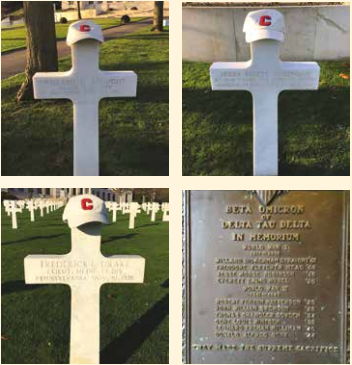Lost, But Not Forgotten
Henry Joe (Cornell, 1982) has made it his passion to find and identify members from his Delta Tau Delta chapter, who served in war and are buried in Europe. The Cornell University graduate now resides in Europe for work.
“So far, my journey has just been to find my local chapter’s veterans who’ve been unrecognized, forgotten or never thought of once they left the shelter,” explained Joe.

Joe has a family history of those who have served their country, which has led him to have a great interest in this adventure. His grandfather was an immigrant who came to the United States in 1942 and later served in the U.S. Army. Joe’s grandfather fought and came home alive.
“I tried to retrace his steps with the Third Infantry Division over the course of the years,” said Joe. “I’ve now visited many U.S. military cemeteries in foreign lands.”
It wasn’t only Joe’s family history that led him to gain an interest in locating the burials of many soldiers. His Cornell chapter paid tribute to those lost at war in their shelter.
“One day, I noticed our plaque recognizing Cornell’s most famous alumni Willard Straight and realized he’d died during World War I,” Joe said. “There were other names on the plaque, and I decided to check and see if there were other alumni that lost their lives in a foreign land.”
The journey for Joe began there, but it is nowhere near its end. He continues to research and visit sites. He explained that with the 100th anniversary of World War I underway, he is eager to learn more.
“Every one of the soldiers, airmen, sailors and other men and women deserve someone to go visit them, Delts or non-Delts.” “They’re all important, it’s hard to say I recognize just the Delts. They’re all unfinished stories cut short. I had to start somewhere, and I start with the places that I have a connection to,” Joe said. “If I can bring others to visit and remember these graves that probably haven’t had anyone visit them for 50+ years, particularly the WWI graves, I will have served something for those still living.”
